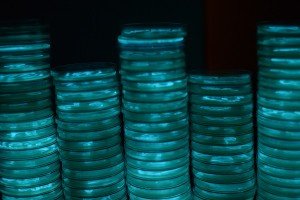
Glowing green bacteria has been produced illegally in New Zealand using mail-order kits from America, Tom Hunt reports in The Dominion Post.
The kits, ordered by educational institutes, contain harmless E. coli bacteria and plasmids with a gene for glowing under UV light.
While these separately don’t pose a legal problem, educators that combine them to produce glowing bacteria are technically in breach of New Zealand’s Hazardous Substances and New Organisms Act – where no new organisms can be created in New Zealand without a containment facility and governmental approval.
A recent blog post by Siouxsie Wiles discusses the issues laid out in the article and questions the government’s idea of what is a ‘new organism’, with the suggestion that “New Zealand needs to have a rational discussion about genetic engineering”.
An excerpt of the Dominion Post article (read the article in full here):
Glowing green bacteria has been produced illegally in New Zealand using mail-order kits from America.
The genetically engineered E coli bacteria were made in two unnamed New Zealand educational institutes and discovered after an investigation by the Ministry for Primary Industries (MPI), which has released details to Stuff.co.nz.
While the glowing bacteria pose no danger to people, critics have argued there was always a risk when playing with DNA, and the kits make the controversial science a “play thing”.
There were 33 Bio-Rad Bacterial Education kits imported to New Zealand, sparking an MPI investigation in March and April last year.
According to Bio-Rad’s website, the kits allow students to transform bacteria by introducing a gene from the bioluminescent jellyfish, Aequorea victoria, making them glow fluorescent green under ultra-violet light.
“The same procedure has been used to create ‘designer proteins’ which have led to the explosion of new health treatments, agricultural applications, and environmental solutions,” the United States-based company says.
According to MPI’s investigation, there was nothing wrong with importing the kits.
But they contained materials that, when put together correctly, produced a modified strain of E coli.
This counted as new organism under New Zealand’s Hazardous Substances and New Organisms Act, MPI said.
It was illegal to produce a new organism without a containment facility and approvals from MPI and the Environmental Protection Agency (EPA).